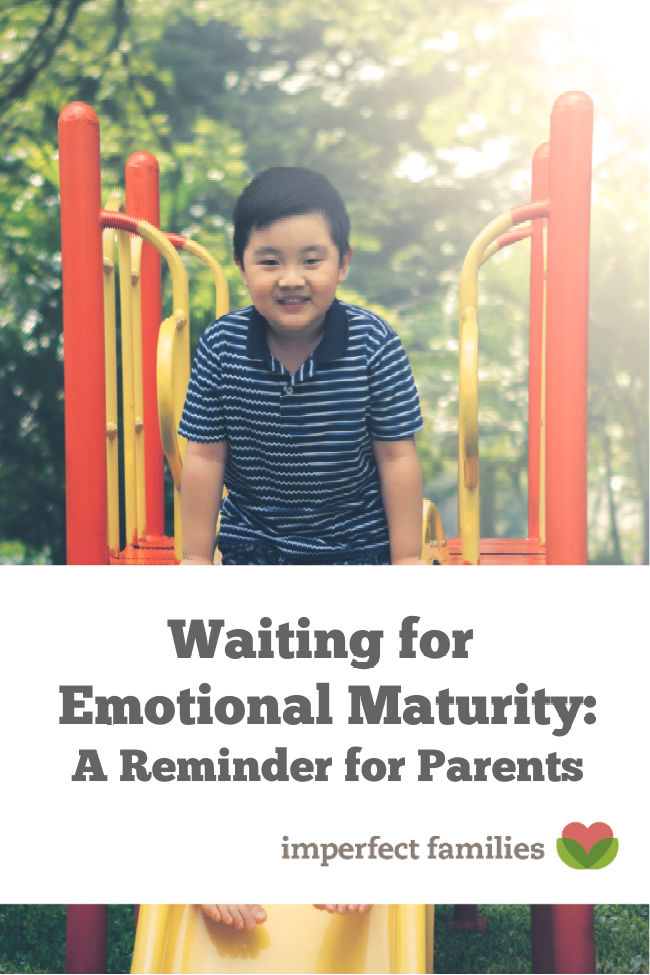Feeling frustrated because your child seems “too old” for certain behavior? This post will encourage you as you wait for them to mature emotionally.

Thank you to April Finley for this guest post. Read more about her in the bio below!
When my firstborn was between five and six years old, I felt pressured to teach him to read. We homeschool, so the pressure wasn’t from school – at least, not exactly – but my friends’ kids were starting to read, and following my gut and his cues (which both said he wasn’t ready or interested yet) felt counter-cultural, if not downright negligent.
The thing is, I didn’t believe for a second that all kids should be reaching the same milestones at the same age.
My child learned to read at the exact moment he was ready, and when he did, he learned quickly and exuberantly. There was never any reason for panic or pressure. He knew I was there to help if and when he needed it, and in the meantime, we would continue to cuddle and read books together.
And yet…when it comes to behavior, I find myself believing a similar misconception, that age should dictate emotional maturity.
When my toddler knocks down an older sibling’s block creation, I remind his siblings that the toddler wasn’t being unkind, but simply curious and experimental. After all, he’s one. But when my elementary-aged child struggles with emotional outbursts and self-control, I feel frustrated and defeated.
I forget that my children are not machines but humans, “fearfully and wonderfully made” (Psalm 139:14) by a God that has fashioned them each individually, even knowing the number of hairs on each of their heads (Luke 12:7).
I forget that maturity is not a result, but a process.
I forget that I’m also a work in progress, in need of God’s forgiveness and grace each and every day.
I forget that just as not all children reach physical and academic milestones at the same age, they also cannot be expected to reach emotional maturity at a specified age.
Maybe you’ve heard how the Chinese bamboo tree grows. For the first three or four years, the tree is getting established in the ground; it doesn’t even break through to the surface. But then, often five years after planting, it not only emerges, but can grow to a height of 90 feet in five weeks’ time. The waiting is long, and the trees require faithful care even when there are no visible results, but in the end, there is growth.
Just as with the Chinese bamboo tree, parenting our children is anything but passive. We don’t just sit back and hope our children achieve emotional maturity.
We work on our own responses to disappointment and hardship, modeling the behavior we hope to see.
We come along beside them, giving them tools to help them along the way.
We sit with them without an agenda, and listen.
We give them grace – lavishly, generously – when they struggle.
And we throw away the timeline in our minds that insists children should be a certain way or do a certain thing by a certain date, caring for them daily, faithfully, and embracing them exactly where they are, as they are.
I’m only a few steps into my own parenting journey and learning more each day, but if there’s one thing I’m sure of, it’s this: these children we’ve been given will grow at the exact moment they are ready.
 April Finley is a former teacher turned homeschooling mom. Her toddler and elementary-aged kids now teach her to slow down, enjoy the simple things in life, and always be open to learning something new (like how to be a more intentional parent!).
April Finley is a former teacher turned homeschooling mom. Her toddler and elementary-aged kids now teach her to slow down, enjoy the simple things in life, and always be open to learning something new (like how to be a more intentional parent!).
Other Posts by April:



Comments have been turned off to retain the privacy of all families. If you have a question or comment on the topic, you're always welcome to contact me.